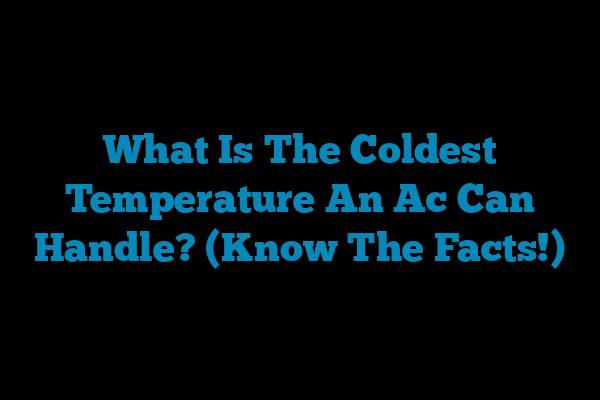It’s summertime and the weather is hot, but how cool can you get? We all know that air conditioners are designed to keep us comfortable in the heat, but did you know that there is actually a limit to how cold your AC can go?
It turns out that the coldest temperature an AC can handle depends on several factors. In this article, we’ll explore what these factors are and why it’s important to understand them.
When the weather gets hot, our first instinct is usually to crank up the AC as low as it will go. But did you know that running your AC too cold can have negative consequences for both your energy bill and the environment?
Not to mention, running your system too low could also mean sacrificing comfort and even damaging your equipment.
So what is the coldest temperature an AC can handle? Keep reading to find out! We’ll discuss why understanding this information is important and how you can use it to keep yourself cool while still saving money and being environmentally friendly.
Components Of An Air Conditioner
An air conditioner is composed of several components that work together to cool a space. The ac condenser is the outdoor unit of the air conditioner; it uses a refrigerant to absorb heat from within the area.
The ac compressor moves this refrigerant between the condenser and evaporator, which is located indoors. The ac evaporator takes in warm air from the room and passes it through coils containing cooled refrigerant.
Finally, the ac fan motor blows this cooled air back into the room to reduce temperature. This process helps maintain a comfortable atmosphere inside a given space, but several factors can affect its performance.

Factors Affecting Ac Performance
The coldest temperature an air conditioning (AC) unit can handle is determined by several factors. These include humidity levels, air flow, the condenser unit’s capacity, and insulation type.
Understanding each factor helps ensure your AC runs efficiently and cooling performance remains optimal:
- Humidity levels: High humidity can strain a unit, making it work harder to cool down the area.
- Air flow: The air should flow freely in and out of the vents for efficient cooling.
- Condenser unit: The condenser must be able to handle the outdoor temperatures of the area where it is installed.
It’s also important to keep your air filter clean and your insulation up-to-date. If any of these components are not properly maintained, then your AC may struggle to keep temperatures low.
By keeping all of these factors in mind, you can help ensure your AC unit will meet its optimal performance level even in extreme temperatures.
Minimum Temperature Setting
Overall, the minimum temperature setting of an AC unit is a crucial factor in achieving optimum cooling efficiency. It’s important to understand how low you can safely set your thermostat.
Generally speaking, the coldest temperature an AC can handle is between 60 and 65 degrees Fahrenheit. However, it’s best to consult your manufacturer’s guide to determine the exact lowest temperature setting for your specific model and make sure it’s within the safe range.
When setting the AC minimum temperature, consider factors such as humidity levels and weather conditions. If you turn the temperature too low during hot and humid days, it may create condensation on windows or walls and cause mold growth.
Additionally, running an AC at a lower-than-recommended temperature can lead to increased energy consumption and strain on its components.
For maximum efficiency, set your thermostat at a comfortable level that’s slightly higher than what you would normally set in colder weather – about 78 degrees Fahrenheit is recommended for most areas during summer months. You should also regularly check for any signs of damage or malfunctioning components in order to keep your AC running efficiently all season long.
The next step is to learn more about tips for optimizing cooling efficiency and ensuring that your air conditioner runs properly all year round.
Tips For Optimizing Cooling Efficiency
As an air conditioner (AC) ages, its ability to efficiently cool a home can diminish. To ensure the AC is operating at its peak performance and energy-saving levels, follow these tips:
1. Adjust the thermostat to the warmest temperature that still provides comfort in your home.
2. Schedule annual maintenance for your AC unit.
3. Replace or clean air filters regularly as instructed by the manufacturer of your AC unit.
4. Invest in a temperature control system to keep your home’s temperature consistent throughout all areas of your house.
The coldest temperature an AC can handle depends on several factors such as how well it is maintained and how large the air conditioner is sized for the space it is cooling. Following these tips will help optimize cooling efficiency and make sure that your AC functions effectively and efficiently throughout its lifespan, saving you money on energy costs in the long run.
Conclusion
In conclusion, it’s important to remember the components of an air conditioner, how they can affect performance, and the minimum temperature setting. The coldest temperature an AC can handle depends on a variety of factors and may vary from one model to another.
To get the most out of your air conditioner, it’s best to make sure you have it serviced regularly and that you optimize its efficiency by taking steps such as sealing any leaks or insulating windows. With proper maintenance and optimization, you’ll be able to keep your home cool no matter how hot it gets outside.




